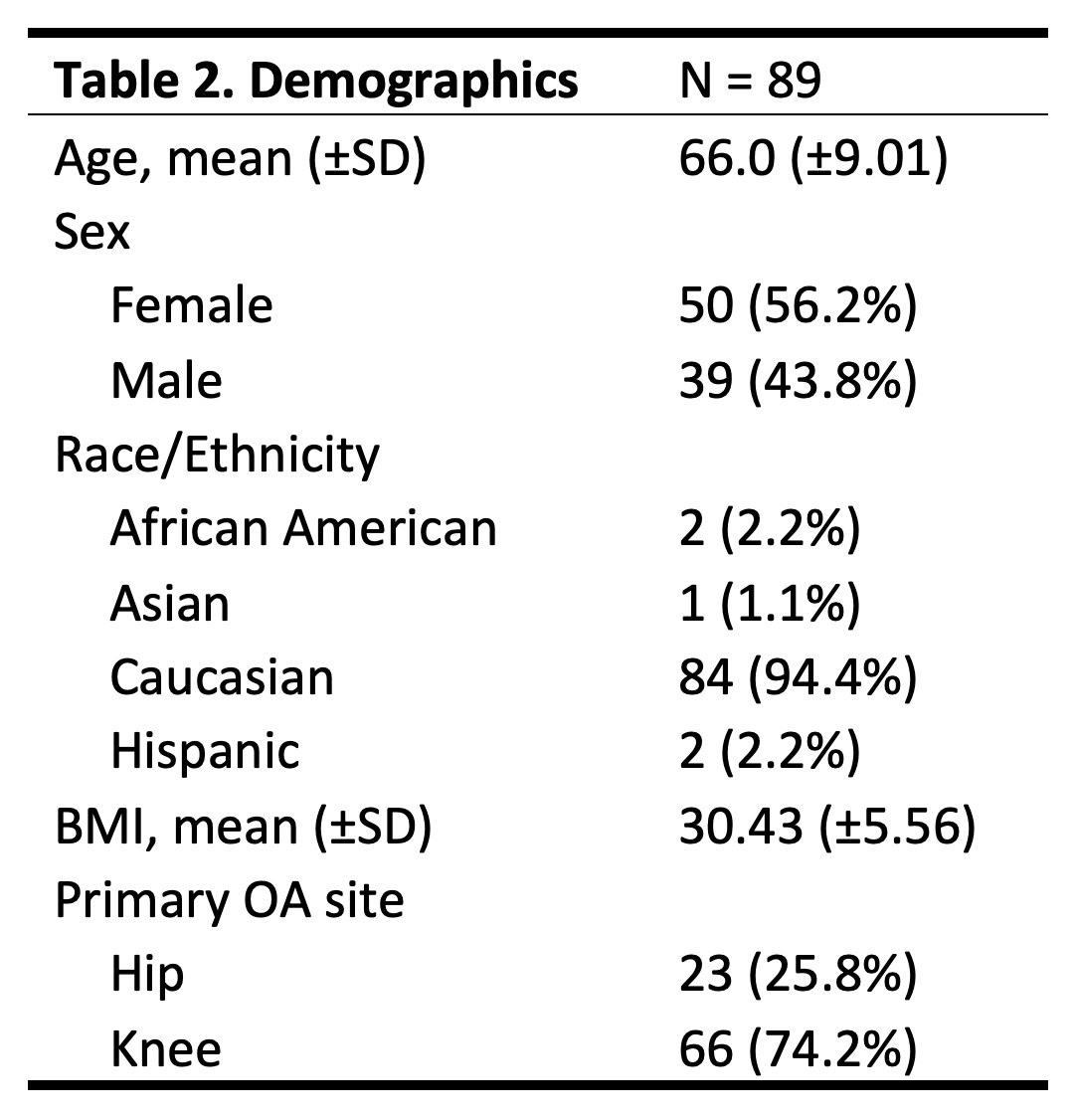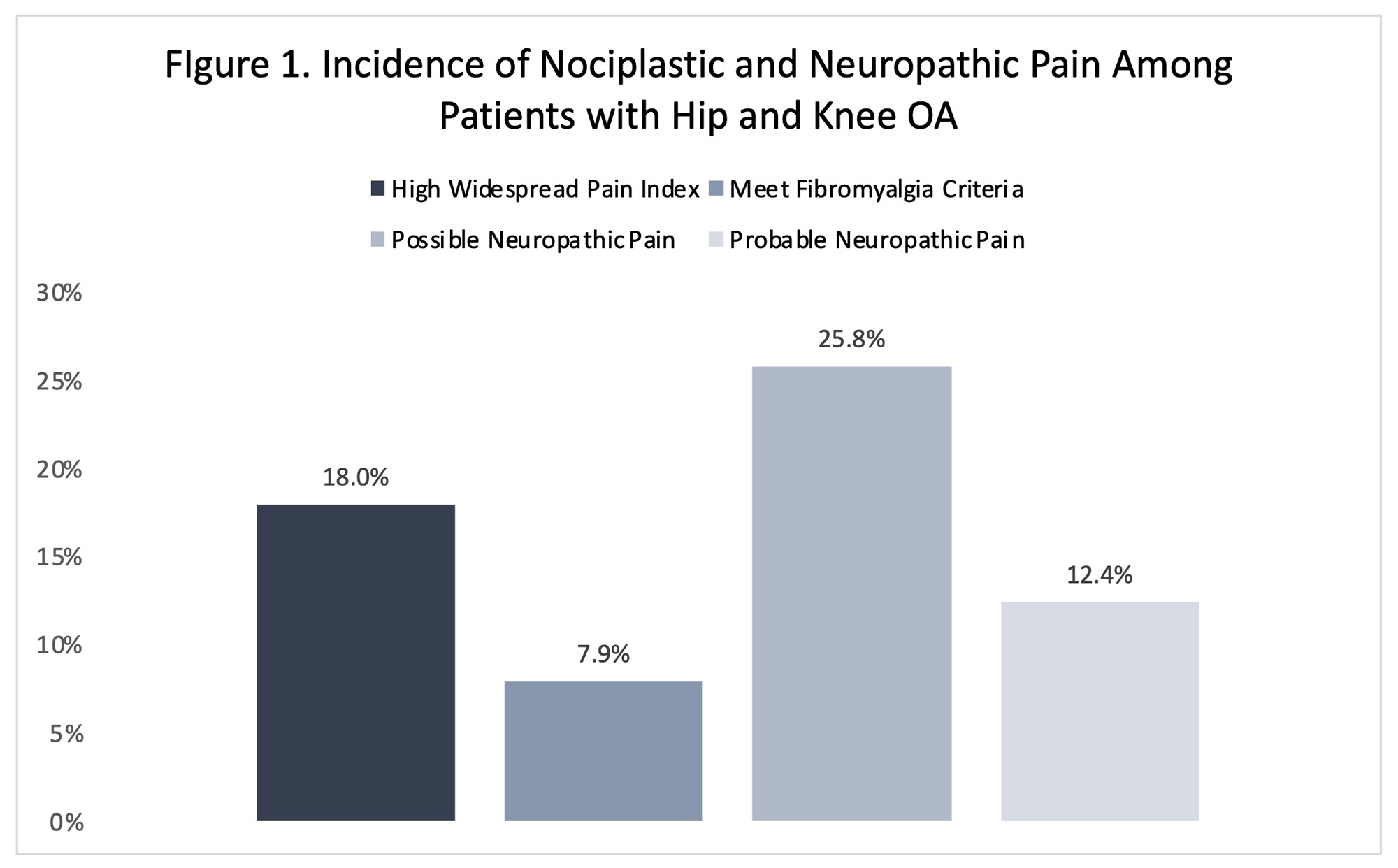Session Information
Session Type: Poster Session B
Session Time: 9:00AM-11:00AM
Background/Purpose: Chronic pain in patients with hip and knee osteoarthritis (OA) has been classically attributed to nociceptive pain pathways. Emerging evidence has demonstrated influence from additional pain pathways in OA (Table 1). In this study, we screened for pre-operative neuropathic and nociplastic pain in patients who subsequently underwent hip or knee arthroplasty.
Methods: Participants filled out two surveys reflecting pre-surgical pain: 1) the PainDETECT questionnaire (PD-Q) to assess neuropathic pain, and 2) the Fibromyalgia Survey Questionnaire (FSQ). The FSQ is comprised of the Widespread Pain Index (WPI) assessing widespread musculoskeletal pain and the Symptom Severity Scale (SSS) assessing comorbid symptoms (e.g., fatigue). The 2016 fibromyalgia criteria were used as inclusion criteria for fibromyalgia diagnosis.
Results: Overall, 89 participants were included in our analysis (23 hip OA, 66 knee OA). The mean age was 66.0 ± 9.01 (mean ± SD), 50 were female (56.2%), 84 were Caucasian Non-Hispanic (94.4%), the mean BMI was 30.43 ±5.56 (Table 2). Of this cohort, 18.0% had widespread pain (WPI ≥ 7), 7.9% met diagnostic criteria for fibromyalgia, 25.8% had possible neuropathic pain (PD-Q 13-18), and 12.4% had probable neuropathic pain (PD-Q ≥19) (Figure 1). This represented 34 (38.2%) unique individuals. We did not find significant differences in age, BMI, sex or site of OA among those with versus without widespread pain, fibromyalgia or neuropathic pain.
Conclusion: Among patients with hip or knee OA who underwent joint arthroplasty, more than a third had evidence of pre-operative nociplastic and/or neuropathic pain. This has clinical relevance, as nociplastic and neuropathic pain may have decreased responsiveness to peripherally directed therapies such as surgery. Given the evidence that there are multiple mechanisms of pain within individuals, this implies a need for multiple therapeutic targets in many patients. Elucidating these pain pathways in future studies will be key to more effectively treating hip and knee OA pain.
Disclosures: C. Conran: None; L. Moreland: Boehringer-Ingelheim, 12, member of independent Data Safety Monitoring Board, Celltrion, 12, member of independent Data Safety Monitoring Board; A. Clauw: None; J. Seifert: None; C. Keeter: None; C. Hogan: None; M. Dayton: None.
To cite this abstract in AMA style:
Conran C, Moreland L, Clauw A, Seifert J, Keeter C, Hogan C, Dayton M. Evaluating Neuropathic and Nociplastic Pain in Patients with Hip and Knee Osteoarthritis [abstract]. Arthritis Rheumatol. 2023; 75 (suppl 9). https://acrabstracts.org/abstract/evaluating-neuropathic-and-nociplastic-pain-in-patients-with-hip-and-knee-osteoarthritis/. Accessed .« Back to ACR Convergence 2023
ACR Meeting Abstracts - https://acrabstracts.org/abstract/evaluating-neuropathic-and-nociplastic-pain-in-patients-with-hip-and-knee-osteoarthritis/



